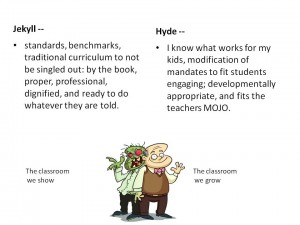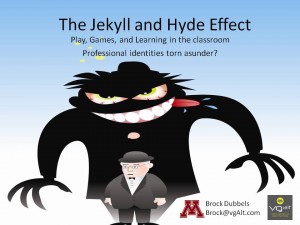The Jekyll and Hyde Effect — Play, Games, and Learning in the classroom Professional identities torn asunder?
The Jekyll and Hyde Effect calls into question approaches to accountability and implementation of mandated approaches to research-validated techniques and assessment in classroom instruction. Dissonance between teachers core beliefs about student learning and these new mandates, as presented to them, may be creating two different identities, two different classrooms, and two different sets of books to satisfy mandates and continue doing what they know works. This study utilized discourse analysis, coding teacher artifacts as outcomes of genre chains with themes from mandates, policy, and law for classroom changes in curriculum and instructional assessment tools, materials, and professional development. The informants from the studies and findings from analysis of the artifacts reveal that many teachers do not feel that what is good for the spreadsheet is good for kids. This tension in core beliefs about learning and instruction need not lead to conflict– integration of assessment and appropriate implementation could enhance teacher and student experience. The transformation of policy to implementation was seen as problematic and led to misunderstanding and conflict, often based upon an inability to see standards, benchmarks, and assessments integrated into engaging, play-like activities such as games rather than the controlled, direct instruction that might cause resistance and disinterest by students and instructors, but easy to identify by administrators. The presentation makes a case for the importance of play in engagement and comprehension through review of literature on intelligence measures and new research on embodiment theory and the indexical hypothesis. Then it give examples of implementation.
New models of comprehension and memory validate the value of active and playful learning for cognitive enhancement and generative transfer. Data on academic performance and engagement measures from five years of games, play, and virtual space learning in K-20 classrooms will be presented in the context of assessment measures using a model for assessing cognitive growth. This is contrasted with educator beliefs, the efficacy of play, and the limitations of models of teacher professionalism creating a Jekyll and Hyde Effect. Though interviews, artifacts, and surveys, K-20 educators have expressed a willingness to embrace games, but have been reluctant to do so publicly for fear of professional reputation, as well as the ability to implement such pedagogical change.
In this presentation, on overview of research, methodology, outcomes, and descriptions of implementation will be presented on how video games and virtual worlds were used to raise standardized reading scores. This evidence, methodology, and experience is presented with outcomes of surveys, interviews, and discourse analysis of teacher artifacts, and presents the institutional experiences of educators balancing the tension of using games and play, and the fear of being stigmatized as unprofessional at their teaching sites. The result begins to create a picture of creating two different sets of books, and two different teaching identities — Jeckyll and Hyde.








[…] be in competition for merit and entitlement as we see at work and especially now in school with the ridiculous emphasis on assessment. Even Diane Ravitch, who advocated for the emphasis on testing has changed directions based on […]